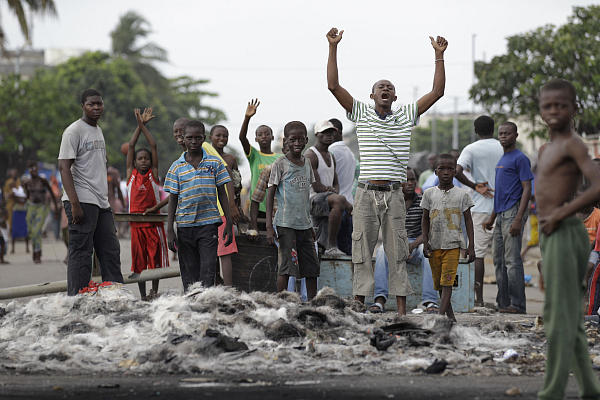2011-03-01 Violence escalates in Abidjan, Ivory Coast as human rights organizations recall horrors of civil war
Violence has continued today in the economic centre of Ivory Coast, the south-eastern city of Abidjan, and has left one dead after clashes between protesters and police forces began early in the morning. Today most of the businesses in the city remain paralyzed and the BBC reports that the La transmission centre of the national television was “burnt down, but is working again, even though the video is of poor quality”. Political tensions over the outcome of the presidential election past November, when the candidate from the opposition Alassane Ouattara accused Laurent Ggagbo, president since 2000, of fraud, have given way to widespread violence in most of the country.

Several days after the official deadline for the results had expired, the Independent Electoral Commission for Ivory Coast claimed Ouattara as the winner with 54% of the votes. The country’s Constitutional Council, however, declared that the commission had no right to publish the results, having missed the deadline to do so. The President of the Council, Paul Yao N’Dre, also said they had decided to nullify around 500,000 votes coming from pro-opposition areas in the north of the country, alleging that the violence and tension that occurred there during the election invalidated the results. They therefore gave a marginal victory to Ggagbo, with a slim 51% of the votes. Both candidates claim they have been sworn into office. The U.N., along with most of the international community, has sided with Ouattara, and imposed sanctions on the Government, calling Ggagbo to step down. Ouattara is known to have strong connections with the West: he studied economics in the U.S. and worked with the International Monetary Fund as an analyst.
On the 19th of February a peaceful pro-democracy was set up by Guillaume Soro, Prime Minister of the Ouattara government, in several places around the country. Most of them were repressed violently by Ggagbo’s Force of Defense and Security (FDS) leaving three demonstrators dead in Abidjan. Media censorship has also been reported and the clashes have escalated progressively, especially in Abobo, a particularly conflictive neighborhood of the city.
Independent media sites covering the unfolding events are saying that the regime is not only using military force on the opposition, but that it is also giving weapons to young loyalists and organizing them, instigating them to fight against militias such as the Forces Nouvelles, operating in the west of the country. According to this blog even young children have been seen carrying weapons, as well as reporting dead bodies with gunshot wounds and slit throats in Abdijan. Human Rights Watch in an effort to avoid “an imminent return to the civil armed conflict that engulfed Côte d'Ivoire in 2002 and 2003”, has called for both sides to do damage control on innocent civilians. They also warn that massive recruitment has been going on by both sides, with Liberian mercenaries included among the regime’s forces, suggesting that “the possible use of former fighters from Liberia's civil war, in which widespread atrocities were committed, raises further concerns about the security of the civilian population”. They also put the number of dead at 17 people, although they admit it could be much higher.
A man, allegedly from the FDR fires a weapon during a protest in Abobo, Abidjan.